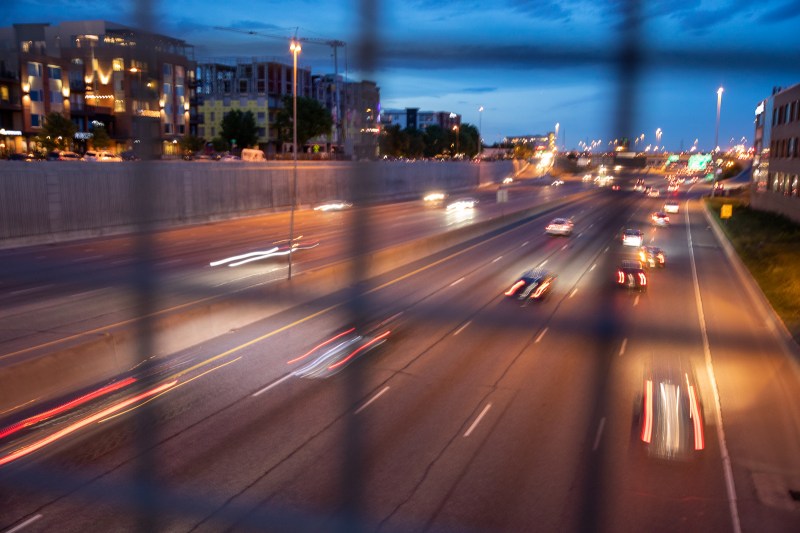SBD in the Colorado Sun: Want to Solve the Climate Crisis? Stop Widening Roads

This story, which was originally published in the Colorado Sun, is part of Streetsblog Denver’s partnership with Covering Climate Now, a global collaboration of more than 300 news outlets to strengthen coverage of the climate story.
Today, children around the world will walk out of their schools to demand adults act now to keep from making their world uninhabitable.
To honor this second Global Climate Strike, Gov. Jared Polis and Mayor Michael Hancock must commit to stop building new roads and expanding the ones we have.
Transportation is the largest source of carbon emissionsin the nation, and it’s growing. Despite more efficient vehicles, auto emissions increased 21 percent between 1990 and 2016 because the total number of miles people drive has gone up 50 percent on average.

Banning new road capacity may worsen traffic in the short-term, and the public will complain. But their outcry should be channeled into changing the way we get around at a pace and scale equal to the immensity of the problems posed by congestion and the climate crisis.
Officials should lay the ground so that neighborhoods can soon provide more of the things residents need while driving less. They must also vastly improve sustainable forms of transportation, like walking, biking and transit.
This may sound crazy to people who can’t imagine driving less. But many Coloradans have proved they will get out of their cars when they have better options.
Downtown Denver is the most transit-rich place in the state and already more workers take transit than drive there, according to the Downtown Denver Partnership’s last commuter survey. Bustang, the Colorado Department of Transportation’s new regional motor coach service, is a hit. And the Regional Transportation District’s Flatiron Flyer and A-Line airport train have shattered ridership expectations.

But these high-quality transit experiences are not the norm. Many of RTD’s buses and trains come infrequently. After crawling through traffic-clogged streets, they often show up late. And the overall rider experience is not as good as it should be.
We could make every transit line dramatically better, and such transformative changes are possible with transportation dollars we already have.
The federal government guarantees states can access more than $40 billion per year for highways, according to Transportation for America. But just $2.6 billion is available for new or expanded public transit. The feds also pay for up to 80 percent of the cost of a highway, versus up to 50 percent for a transit project.
Gov. Polis and Mayor Hancock must demand that our leaders in Washington fix this imbalance. Because when more people hop on buses and trains, it would reduce traffic congestion while having a huge impact on carbon emissions.
Heavy rail transit, like RTD’s A, B and G commuter lines, generate 76 percent lower carbon emissions per passenger mile than someone driving alone, according to the Federal Transit Administration. Light rail produces 62 percent fewer emissions, while buses belch 33 percent less.
No direct emissions come from walking and biking, and Denverites are doing more of both. Downtown, where the city has the fastest-improving bike infrastructure, 9% of workers arrive by bike, a 36% increase since 2016. And of all downtown commuters, 6.9% walk.

But as more people walk and bike around the city, quickly rising traffic fatalities highlight the inadequate investments Denver is making toward safer streets.
As Colorado leaders aim to reduce transportation emissions, they must be wary of emerging technologies. Hyperloop, self-driving cars and electric vehicles will not be our climate savior.
in January, Gov. Polis signed an executive order to promote electric vehicles, which remains his only major transportation initiative so far. But it’s likely to have minimal impact on the state’s greenhouse gas emissions.
Colorado will require more zero-emission vehicles under a standard adopted last month. But of all the vehicles an automaker sells, just 6.23% must be a ZEV by 2030. That leaves 93% of vehicles spewing greenhouse gases a decade from now.

If we continue on our current path, Front Range vehicle emissions are estimated to decline by just 8.8% between 2020 and 2040, according to the 2018 Greenhouse Gas Emissions estimate from Denver Regional Council of Governments.
We also need larger numbers of people to live in walkable neighborhoods along transit lines. That translates to more duplexes, fourplexes and taller buildings.
These measures may seem extreme, and some may revolt.
But to those who fear development will bring displacement and gentrification, they must acknowledge that increasing the supply of housing will help keep prices down and avoid pushing people out of their communities.
And to the many wealthy liberals who fight everything from bike lanes to new housing, it’s time they stop refusing to live by their values. They must end their often hysterical opposition to progressive transportation and housing policies now.

But politicians, too, must brace themselves and push forward changes that may be unpopular. And that is exactly why people who support addressing the climate crisis should reach out to Gov. Polis (GovernorPolis@state.co.us) and Mayor Hancock now.
Tell them that you support courageous transportation and housing measures to address the climate crisis today. Because to keep the current climate disaster from reaching apocalyptic proportions for future generations, we must act audaciously and immediately.
It’s a point echoed by Greta Thunberg, the 16-year-old who inspired more than a million protesters in 125 countries to join the first Climate Strike last March.
“The politics needed to fix this, doesn’t exist today,” she said. “We should do as individuals and use the power of democracy to make our voices heard, and to make sure that the people in power cannot continue to ignore this.”
Andy Bosselman is editor and executive director of Streetsblog Denver, a publication that covers the movement for better walking, biking and transit.

 This story, which was
This story, which was 

